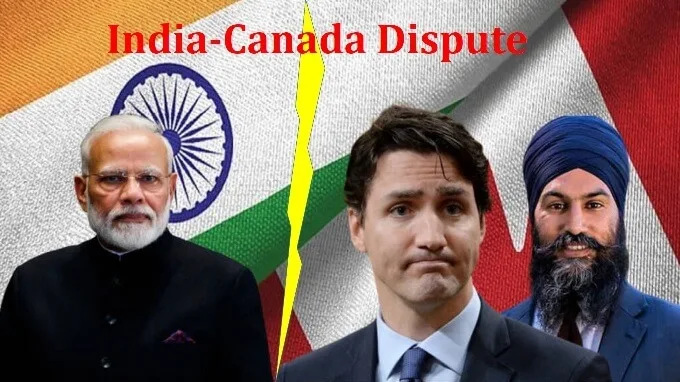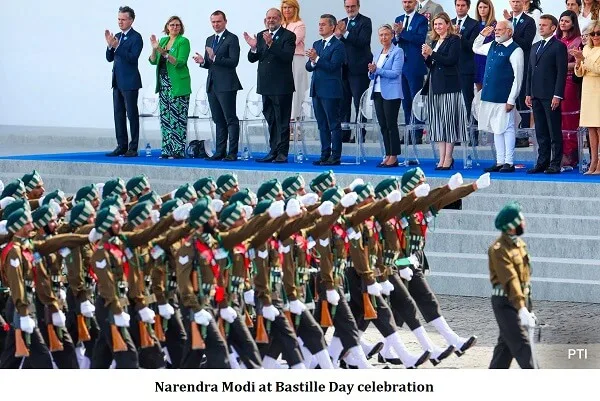
On September 10, 2023, something quite captivating happened. Several World leaders were led by Indian Prime Minister Narendra Modi, to the Rajghat at New Delhi. They were there to honor Mahatma Gandhi during the G20 summit. What made this moment so striking was to see these influential leaders, some even barefoot or in slippers, wearing shawls. Indeed, it is just the growing influence of India on International relations. But, behind this show of unity, trouble was brewing. No one know that the India-Canada dispute would quickly escalate into a serious diplomatic crisis. It will be further raising doubts in the minds of India’s western allies. Further, raising issues regarding the country’s position as a world leader and so-called “Vishwaguru” or teacher to the world.
The Background Drama
Later that day, a discreet exchange between Modi and Canadian Prime Minister Justin Trudeau had set the stage for a tumultuous turn of events. Modi confronted Trudeau regarding what he termed “anti-India activities” within Canada. It particularly related to Sikh separatists advocating for an independent “Khalistan” state in India’s Punjab. These elements were accused of inciting violence against Indian diplomats and missions, thereby endangering the Indian community in India.
To add fuel to the fire, on a Monday in Ottawa, Trudeau publicly unveiled allegations on Indian. The allegation stated of India’s involvement in the assassination of Hardeep Singh Nijjar. Hardeep was a Sikh separatist killed in Vancouver in June. Some News agencies reported that western leaders, while outwardly praising Modi for the success of the G20 conference, had privately expressed reservations regarding Canada’s allegations. These allegations were nothing less than shockwaves that rippled across the diplomatic world.
Expelling Diplomats and Visa Standoffs
In the wake of these allegations, both India and Canada expelled each other’s diplomats, and India halted visa issuance to Canadian citizens, affecting a vast Indian diaspora of over 2.3 million people. The two countries expressed their concern about the security threat to their respective diplomats. However, India emphatically rejected Canada’s accusations and mentioned to be meaningless.
Geopolitical Implications of India-Canada Dispute
If we consider world politics, this dispute between the two big nations – India and Canada is very significant. The diplomatic relation of India and Canada with nations like the United States, the United Kingdom, Australia will also be impacted due to this disagreement. On one hand, these nations consider India as an important ally by these countries to counter China because India is known for its diplomatic ideals. But on the other hand, Canada has special significance because it is one among the west countries. In its aspirations for the region bordering the Indian and Pacific Oceans, India has emerged as a vital participant. This covers activities like creating high-tech products, employing artificial intelligence, and conducting defense.

For instance, a notable gesture of strengthening ties was when President Biden extended an invitation for a state dinner to Modi. Similar to this, the UK is presently negotiating a comprehensive free trade deal with India following Brexit. While France which is the second-largest arms supplier to India went a step ahead. It invited the prime minister of India as the guest of honor at its Bastille Day celebration. India’s active involvement in the Quad strategic security strategy solidifies its position as a crucial partner in containing China’s expanding influence.
However, when it comes to their relations with both India and Canada, these Western countries today find themselves in a precarious balancing act. If substantial and credible evidence supporting Canada’s claims were to surface, these nations would face a dilemma. When tensions with China are on the rise, there is a chance that a larger disagreement might jeopardize India’s tight relationship with the United States. No one involved would want to be in this scenario.
The Aftermath of India-Canada Dispute
Complicating matters is the strong domestic support Modi enjoys in India, with many citizens rallying behind him. As he is demanding evidence from Canada to substantiate its allegations. This support has been strengthened further by sensitivity to criticism from abroad, especially in the wake of India’s successful hosting of the G20 summit and in advance of an upcoming general election where Modi’s reputation abroad would be a key issue.
Conclusion: Balancing Act in a Shifting World Order
The India-Canada dispute has opened the eyes of each individual whether supporting the government or criticizing its policies. It has made it clear that how complicated global politics can be nowadays. Western democracies have to be really careful as they make friends and deals in a world that keeps changing.
In a world where democratic values sometimes clash with what’s strategically smart, the India-Canada dispute makes us wonder if it’s worth taking sides. At international level there is no permanent ally and no permanent enemy, all depends on the countries respective benefit. Keeping it in mind I would strongly say that the government of India should prove itself as a “Vishwaguru” through its action rather than through speeches. And let other countries declare us as a Vishwaguru instead of declaring it ourselves.
We’re not sure if these Western countries can find a good balance between standing up for democracy and protecting their own interests. What happens in this diplomatic crisis will definitely affect how countries team up globally.
